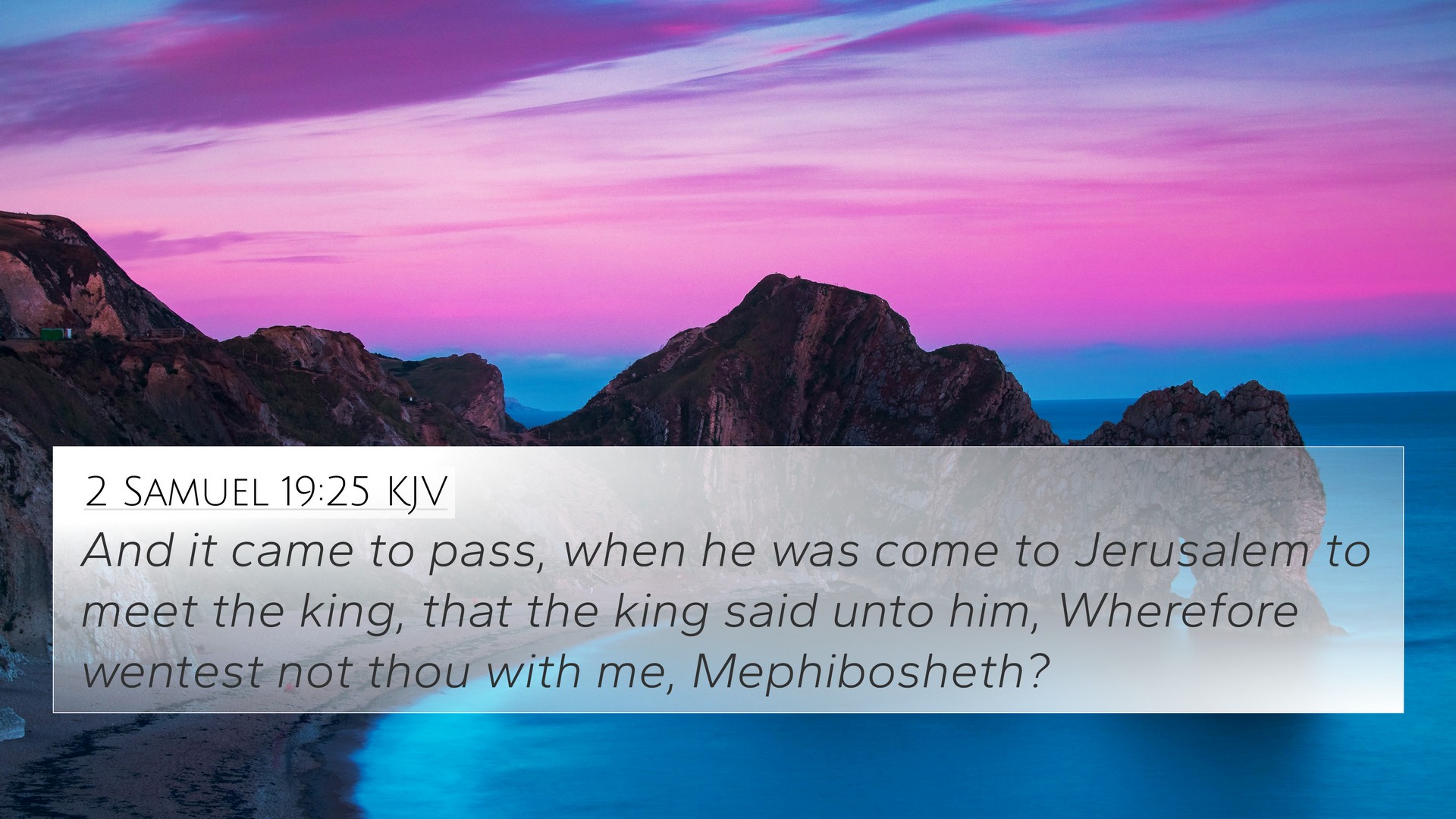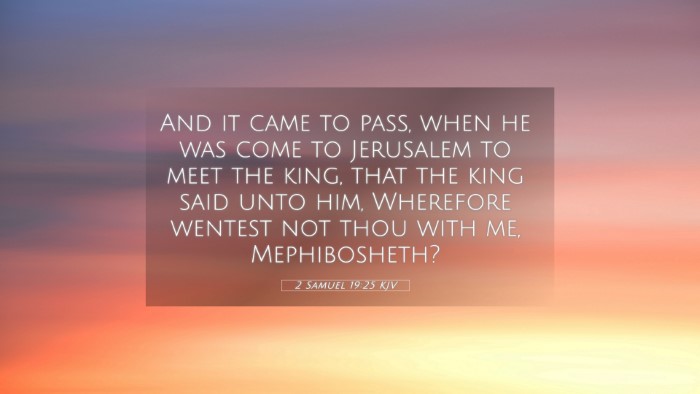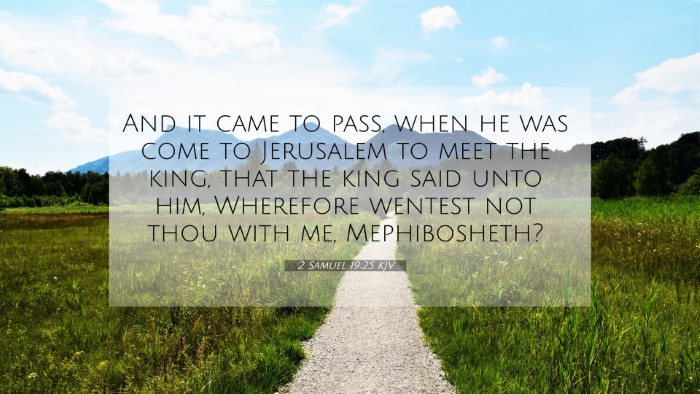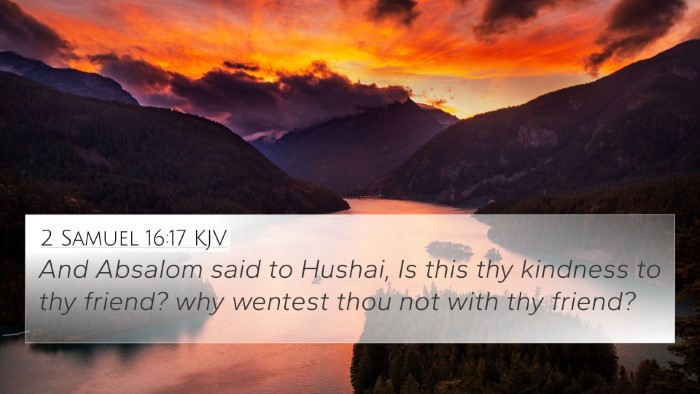Understanding 2 Samuel 19:25
Bible Verse: "And it came to pass, when he was come to Jerusalem to meet the king, that the king said unto him, Wherefore wentest thou not with me, Mephibosheth?"
Summary of the Verse
This verse captures a poignant moment in the narrative of King David where he questions Mephibosheth about his absence during his flight to Jerusalem. Mephibosheth, the son of Jonathan and the grandson of Saul, had a physical disability which limited his mobility, yet he had a significant role within David's court. This passage opens up deeper themes of loyalty, trust, and the complexities of familial relationships.
Insights from Commentaries
-
Matthew Henry:
Henry notes that David's inquiry reflects his underlying feelings of betrayal. Mephibosheth's absence was suspect given his previous loyalty. Yet, it also shows David's yearning for reconciliation, as he seeks to understand the situation rather than hastily condemning Mephibosheth for not joining him.
-
Albert Barnes:
Barnes emphasizes the importance of David's address to Mephibosheth, understanding it as a moment of potential restoration. He discusses the context of Mephibosheth’s loyalty and his claims of being misled by Ziba, David’s servant, who had spread false information about him.
-
Adam Clarke:
Clarke elaborates on the socio-political dynamics at play in this verse. He highlights how Mephibosheth’s disability did not diminish his value as a loyal subject. Furthermore, Clarke points out that this moment serves to illustrate the need for patience in judgment, reflecting human fallibility and the complexities of truth.
Bible Verse Cross-References
This verse can be connected to several other scriptures that provide a broader context and enhance understanding:
- Joshua 9:15 - Discusses the importance of loyalty and the covenantal relationships in the context of David's rise to power.
- 2 Samuel 9:1-10 - Highlights David’s earlier kindness to Mephibosheth and his intent to honor the house of Saul, showcasing the depth of their relationship.
- 2 Samuel 16:1-4 - Another account involving Mephibosheth during David's flight, hinting at the complex nature of loyalty in times of crisis.
- 2 Samuel 19:26 - Continues the discussion of Mephibosheth and reveals his perspective, essential for understanding his loyalty and motives.
- Psalm 15:1-3 - Reflects on the qualities of those who are allowed to dwell in God's presence, paralleling themes of integrity and truthfulness.
- Luke 6:31 - The principle of treating others as one desires to be treated ties into the themes of loyalty and betrayal present in this narrative.
- Romans 12:9 - Teaches about love that must be sincere, underscoring the importance of honesty in relationships, mirroring the struggles presented in David's query.
Thematic Connections
Several themes emerge from 2 Samuel 19:25 that resonate throughout Scripture:
-
Loyalty & Betrayal:
The dynamic between David, Mephibosheth, and Ziba illustrates the larger biblical narrative concerning faithfulness in relationships.
-
Grace & Restoration:
David’s inquiry represents a desire for grace and understanding, reminiscent of God's grace towards His people.
-
Judgment & Understanding:
The verse invites deeper reflection on how judgment is often clouded by assumptions without understanding the full context.
Conclusion
2 Samuel 19:25 is not merely a historical account but a profound exploration of human relationships, underscored by themes of loyalty, misunderstanding, and the quest for restoration. This passage invites readers to engage with the broader biblical narrative while reflecting on their own lives regarding trust and reconciliation.
Further Study Tools
For those interested in delving deeper, tools for Bible cross-referencing can enhance your study experience:
- Bible concordances provide a comprehensive overview of verses related to specific themes.
- Cross-reference Bible guides can help in identifying connections between Old and New Testament scriptures.
- Utilizing cross-referencing methods within study groups can foster engaged discussions around verses such as this.
FAQs
What verses are related to 2 Samuel 19:25? Verses such as 2 Samuel 9:1-10 and 2 Samuel 16:1-4 are pertinent for a richer understanding.
How do 2 Samuel 19:25 and Psalms relate? The themes of loyalty and integrity found in Psalms parallel with Mephibosheth’s situation.



